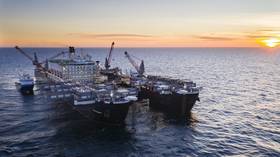Oil pirates are DANGEROUSLY CLOSE to US waters

After hitting a 25 year low last year, oil piracy came back in a big way in 2020, with pirates moving dangerously close to US waters.
Piracy is an age-old problem in the energy industry, often seen in West Africa and other regions of the world. However, following the rise of the phenomenon during the 2020 Covid-19 pandemic, pirates are nearing US shores, presenting a new threat to the industry. Slow-moving oil tankers in the region present an easy target for pirates looking for a ransom opportunity. This has become an increasingly common event in Mexico’s Bay of Campeche, the origin of a significant proportion of US oil, providing around 17 percent of the country’s crude oil and five percent of its natural gas.
“Recent piracy attacks in the Gulf of Mexico are a new development near US waters,” Rockford Weitz, Director of Maritime Studies at Tufts University's Fletcher School told Forbes earlier this month.
“Hundreds of crude oil tankers and refined product tankers (carrying jet fuel, gasoline, and diesel) pass through the Gulf of Mexico each year when transiting to and from refineries in Texas and Louisiana.”
Piracy threats reached a peak in Campeche earlier this year, forcing the US State Department to issue an official piracy warning in April in the southern Gulf of Mexico. Despite this, there has been little media attention on the issue. Piracy is primarily linked to a few hot-spots around the globe, thought of as a distant crime. Previously, Venezuelan waters and Peruvian waters were both flagged as hotspots for pirates, but this zone appears to be expanding.
Also on rt.com Hurricane Laura shut in largest oil production volume since 2008This new trend comes as levels of piracy increased in reaction to the Covid-19 pandemic. In 2019, global maritime piracy plunged to a 25-year low, with just 41 reported cases on large ships of over 100 gross tonnage. However, with the pandemic leading to greater oil storage on the seas, reports of piracy are mounting.
As well as hitting new areas, piracy in Asia doubled in the first half of 2020, over the same period in 2019. Traditional hotspots, such as the Gulf of Guinea off of West Africa which accounts for 90 percent of maritime kidnappings worldwide, remain high-risk areas for energy companies.
This autumn, there have already been several reports of piracy off the coast of West Africa, including an attack on the UK’s Union Maritime oil tanker and Danish tanker Torm Alexandra. That makes a total of three vessels boarded since late October in this region alone.
Although piracy is well known in the West African region, threats of these events spreading to other regions need to be addressed by the energy sector. At present, there are hundreds of platforms, supply and drill ships, and oil tankers operating in the US that are waiting to dock with their cargo and are mostly unguarded.
Also on rt.com This oil crisis will COMPLETELY transform the industryAny cases of piracy on these structures would require a response from the US Coast Guard, which already has limited capacity due to the large geographical area. The failure to respond successfully to reports of piracy could lead to loss of cargo as well as negative environmental effects, such as oil spills.
While pirates have not yet touched US waters, it’s important to consider the need for advanced action before a crisis occurs. Private companies and the Coast Guard may not be enough to secure US oil if better preventative strategies are not put in place.
By Felicity Bradstock for Oilprice.com













